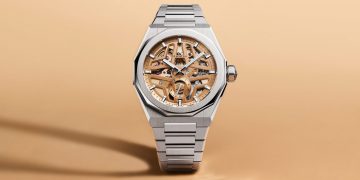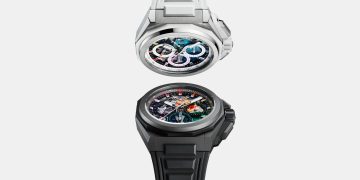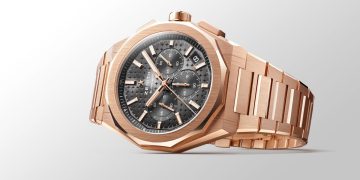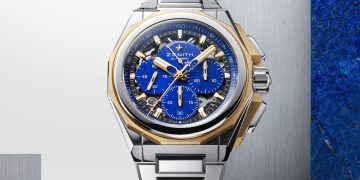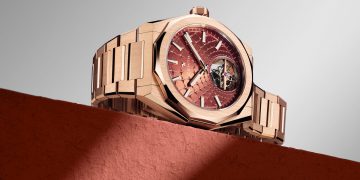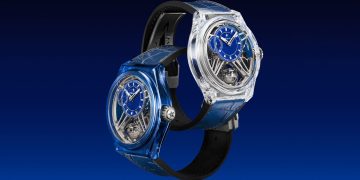Source: Images and content by Vacheron Constantin
http://content.presspage.com/uploads/1999/33d52e2a-1a10-4807-b1d0-fef87f907dee/500_vac-9880c-000a-182c-interior-car3copyrolls-royce.png?10000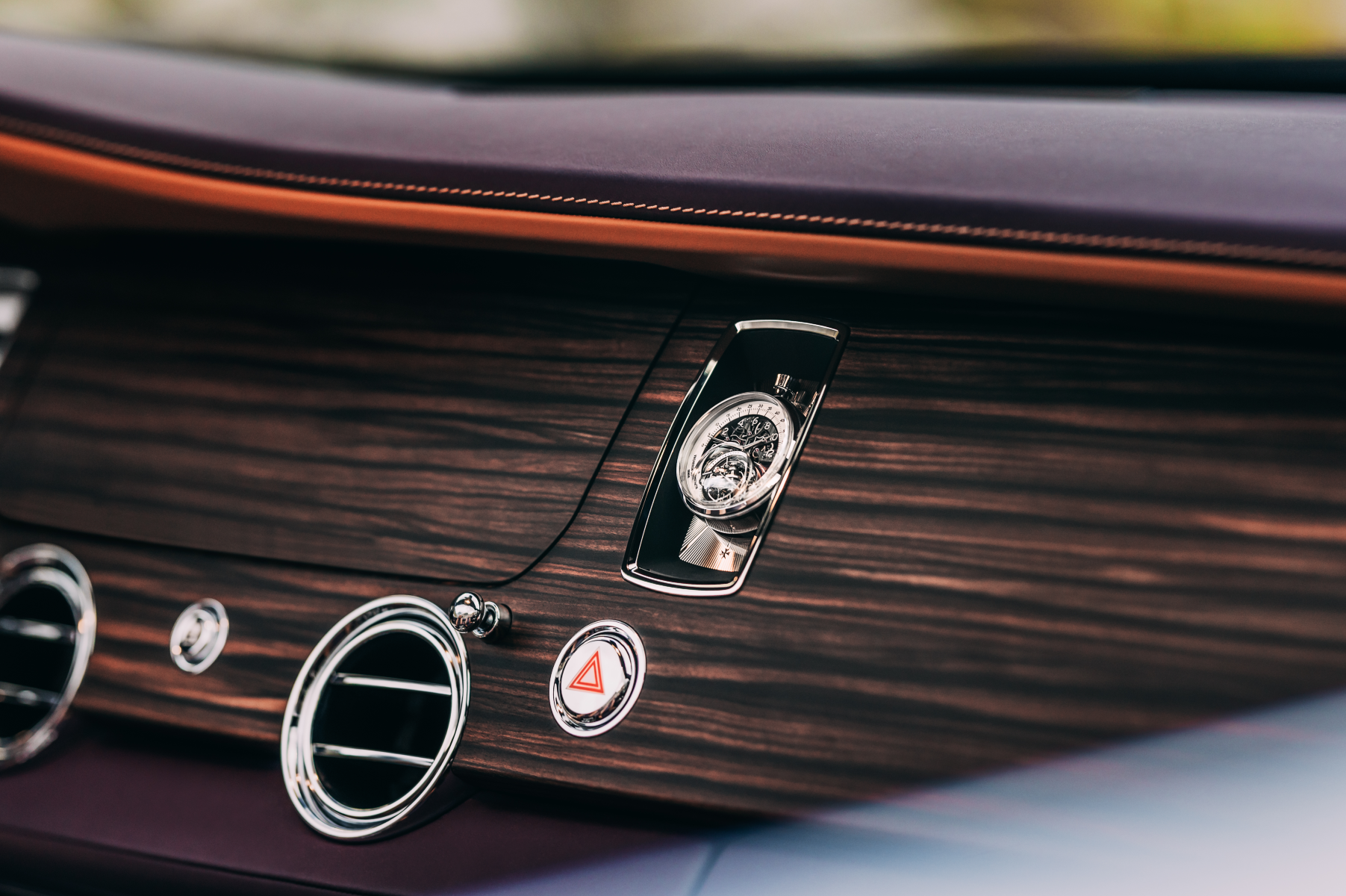
Embargo lifted on 24 August 2023, 9PM CET
- A client with a passion for watchmaking and coachbuilt motor cars brings two leading brands, Rolls Royce Motor Cars and Vacheron Constantin, together in a unique bespoke design project.
- Celebrates the two luxury houses’ shared passion for precision, obsession with detail and artisanal expertise.
- Equipped with a bi-axial tourbillon and double retrograde display, the single-edition Les Cabinotiers Armillary Tourbillon is housed in a secure, removable holder custom-designed by Vacheron Constantin engineers to fit into the fascia of Rolls Royce Amethyst Droptail.
- The finishing of the timepiece and its presentation box echo those of the car’s interior.
In response to a request from a client who collects both luxury cars and fine watches, Vacheron Constantin, the Manufacture has created a unique timepiece designed to fit into the fascia of an exquisite Rolls Royce Coachbuild commission – Rolls-Royce Amethyst Droptail. Working closely with the British luxury house on the technical specifications and finishing details, Vacheron Constantin developed this single-edition Les Cabinotiers Armillary Tourbillon timepiece to perfectly complement the Rolls-Royce Amethyst Droptail’s interior suite. Designed to be displayed on the fascia, which is finished in Calamander Light open pore wood veneer, the timepiece is housed within an elegant, fully integrated yet removable holder mechanism.
Mechanical engineering inspires boundless passions. Whether housed within a motor car or inside the case of a watch, these fuel the inexorable need to master space and time by means of dedicated artefacts. Therefore it is unsurprising that so many clients of luxury with a particular affection for motor cars are also drawn to High Watchmaking – and vice versa.
For Vacheron Constantin, this mutual attraction was reflected in a special request from one of its clients’ to create a fascia timepiece, destined to be housed in a singular coachbuilt commission – Rolls-Royce Amethyst Droptail. This request included some specific and demanding criteria. The timepiece was to blend seamlessly into the motor car’s highly bespoke interior and reflect its aesthetic codes. It had to be elegant and removable, but meet exacting engineering standards for shock resistance and robustness.
Vacheron Constantin’s Les Cabinotiers department – which specialises in crafting bespoke timepieces in accordance with clients’ wishes – was particularly honoured to respond to this request.
While Vacheron Constantin’s archives reveal that a watch was commissioned for an automobile in 1928, this project, designed to fit perfectly within a very particular Rolls-Royce Coachbuild commission, represents a first in the company’s modern history. This in itself was reason enough to accept the challenge, given the celebrated British luxury marque’s commitment to excellence and meticulous attention to detail.
A technical challenge
Commissioned by a revered client who appreciates both the highest expression of Rolls‑Royce Motor Cars and bespoke Vacheron Constantin timepieces, this horological masterpiece presented a wonderful technical challenge. The two luxury houses worked closely together to ensure a seamless integration of the timepiece into the Rolls-Royce Amethyst Droptail’s fascia panel.
Vacheron Constantin master watchmakers worked together with the Rolls-Royce Coachbuild design team to ensure the shapes, materials and colours of the timepiece were in perfect harmony with its environment – all in keeping with Vacheron Constantin’s perpetual pursuit of excellence dedicated to the customer.
“The two centuries-old brands share a quest for perfection that consists of constantly pushing the limits of feasibility”, explains Christian Selmoni, Vacheron Constantin’s Director of Style and Heritage. “This philosophy is an excellent catalyst for innovation and good taste, both technically and aesthetically.”
An exceptional calibre
The watchmakers at Vacheron Constantin suggested to the client to equip this unique timepiece with the exceptional calibre 1990, a hand-wound in-house complication movement incorporating certain technical developments derived from Reference 57260, the most complicated timepiece in the world presented by the Maison in 2015. This choice was notably influenced by the bi-retrograde display with instantaneous return of the hours and minutes. This function is reminiscent of traditional motor car speedometers featuring sweep hands. The hands return to zero at startling speed, but not without exerting a great deal of tension. This particularly demanding mechanism requires special attention to ensure the accuracy of the display and the resistance of the materials used. In this case, the hands are made of titanium, which is extremely light and sturdier than steel.
In addition, this type of configuration with time-related indications on the upper part of the dial provides all the space needed for the mechanical ballet of the tourbillon. On this model, the latter appears in a complex “armillary” version. This term is a nod to the work of 18th century French watchmaker Antide Janvier who invented a moving sphere with a planetary gear known as an armillary. Visually, this tourbillon evokes the interlocking circles and armillas (graduated metal discs) of the famous scientific instrument modelling the celestial sphere. The construction of this type of regulator – designed to compensate for the effects of gravity on the smooth running of the movement – consists of two nested carriages rotating around two different axes at a speed of 60 seconds per rotation to form a sphere in perpetual motion. Given the watch’s vertical position on the car fascia, the presence of such a regulator at the heart of the mechanism is fully justified. The tourbillon was developed at the beginning of the 19th century precisely to remedy the isochronism problems affecting the balance-spring of pocket watches, which were also generally vertically housed in a fob.
In contrast to a flat balance-spring, the cylindrical balance-spring coupled to the balance is another technical feature of this timepiece’s mechanism. Invented by Jacques-Frédéric Houriet in 1814, this type of balance-spring without terminal curves – a particularly rare phenomenon in contemporary watchmaking – gives the tourbillon a perfectly concentric beat, thereby also ensuring enhanced isochronism and hence remarkable precision. To transmit the impulses corresponding to a rate of 18,000 vibrations per hour (2.5 Hz), Vacheron Constantin has developed an escapement consisting of a silicon escape-wheel and pallet-lever with diamond pallets – both materials that reduce friction without the need for lubrication to enhance the mechanism’s reliability. This performance is all the more remarkable in that the instantaneous double retrograde mechanism requires driving torque throughout the power reserve.
Four patents have been filed for the technical innovations featured in Calibre 1990. First, there is the instantaneous retrograde system, controlled by a single minutes cam that perfectly synchronises the jump of the two hands at midnight or noon. The patented escapement collet – a component securing the inner end of the balance-spring – is made of titanium. The fact that this material matches that of the regulating organ results in improved regulator performance. The third patent concerns the architecture of the tourbillon carriages, which rotate every 15 seconds to form a Maltese cross motif, the Vacheron Constantin emblem. The last patent relates the diamond-coated silicon pallet-lever, which offers greater resistance to wear and an optimised friction coefficient.
It is worth noting that for practical reasons, the crown has been deliberately oversized to facilitate winding and ensure a 58-hour power reserve. Positioned at 12 o’clock, it is reminiscent of vintage hand-wound chronometers, just as the minutes track recalls traditional speedometers.
A shared obsession with detail
While the construction of movements – however complex, such as calibre 1990 – has been familiar territory for Vacheron Constantin since its creation in 1755, fitting them inside a motor car is altogether new. Vacheron Constantin’s mechanical engineers had to develop a holding mechanism that, above all, would meet the precise dimensions of the Rolls Royce Amethyst Droptail’s fascia compartments.
The holder was also designed to be removed from its housing if necessary and to allow the watch to be rotated through 180° for setting,winding and admiring the reverse of the calibre. The holders’ slightly curved outer frame is made of polished steel, with a bevelled steel inner frame laser-textured with a black PVD coating. The base watch is affixed to a white gold base-plate, adorned with a hand-crafted sunburst guilloché motif featuring an applied Maltese cross. The holder can be covered with a steel lid, secured with a Maltese cross-shaped lock. When the watch and holder are removed from the fascia and placed in their box, an identical empty holder takes its place.
The attention devoted to details and finishing demonstrate the meticulous care lavished on the project by the Rolls Royce Coachbuild and Vacheron Constantin teams. The sapphire dial of the timepiece reveals the full beauty of Calibre 1990, including a mainplate featuring a mauve-coloured NAC galvanic coating with a circular satin finish – an original shade matching the hue of the Rolls-Royce Amethyst Droptail’s leather seats. On the dial side, the bridges are sharply cut, hand-bevelled and adorned with a Côtes de Genève pattern also found on the rear-side bridges in the same mauve colour.
The watch and its accessories can be kept in a display case in the same Calamander Light open pore wood and the Amethyst leather used for the interior of the Rolls-Royce Amethyst Droptail. The interior of the case itself is slightly curved like the motor car’s fascia.
Vacheron Constantin and Rolls Royce share the same culture of devoting their expertise to meeting the most demanding personalised luxury requirements. Delivered with the car on 24 August 2023, the one-off Vacheron Constantin Les Cabinotiers Armillary Tourbillon watch is to this motor car what time measurement is to the world of speed: essential.
———————————————————–
About Rolls Royce Motor Cars
Rolls-Royce Motor Cars is a true luxury house, creating the world’s most recognised, revered and desirable handcrafted Bespoke products for its international clientele.
The company employs more than 2,500 people at the Home of Rolls-Royce at Goodwood, West Sussex. This comprises both its global headquarters and Centre of Luxury Manufacturing Excellence – the only place in the world where Rolls-Royce motor cars are designed, engineered and meticulously built by hand. Its continuous investment in its facilities, products and people has resulted in a series of ‘record years’ for global sales, peaking in 2022 with over 6,000 motor cars sold worldwide.
Rolls Royce Coachbuild
Rolls-Royce Coachbuild is the marque’s equivalent of Haute Couture and represents the very pinnacle of the Rolls-Royce brand. Created for the patrons who wish to go beyond the canvas of existing Rolls-Royce models, the marque’s Coachbuild division empowers clients to create potent, evocative expressions of personal taste with limitless possibilities for individualization and experimentation.
———————————————————–
SUMMARY
In response to a request from a client who collects both luxury cars and fine watches, Vacheron Constantin has created a bespoke on-board watch for their Rolls-Royce Coachbuild motor car. Working closely with the British luxury manufacturer’s designers and craftspeople, Vacheron Constantin’s teams have crafted the unique Les Cabinotiers Armillary Tourbillon timepiece, housed in a removable and secure holder that fits into the motor car’s fascia. A case in the same wood and mauve leather as the upholstery has also been created to house the watch and its stand once removed from the passenger compartment. As for the movement, Vacheron Constantin’s watchmakers chose in-house Calibre 1990, notably because of its bi-retrograde hours and minutes display reminiscent of traditional automobile speedometers, as well as its bi-axial armillary tourbillon – a nod to 18th century models of the celestial sphere, which performs a surprising mechanical ballet. The extremely meticulous, personalised finishing of the watch and its holder meet the criteria of excellence upheld by Vacheron Constantin, which through this timepiece introduces its first contemporary creation for the automotive world.
———————————————————–
Questions to Christian Selmoni, Director of Style and Heritage at Vacheron Constantin
Why are there hardly any Vacheron Constantin fascia watches for the automotive world?
It is true that, contrary to other Swiss watchmakers, Vacheron Constantin has not designed measuring instruments intended for aircraft cockpits or car fascia– with one exception recorded in our archives for the year 1928. On the other hand, the Maison very quickly made its mark in the creation of watches for aviation professionals and motoring enthusiasts. The advent of the wristwatch in the early 20th century enabled Vacheron Constantin to demonstrate its technical expertise in the production of chronographs, which have become benchmarks in sporting circles. Over the decades, these timepieces dedicated to the measurement of short periods of time have consistently proved able to adapt to the demands of contemporary life, in which sport and travel play an increasingly important role, without ever losing the characteristic elegance of these creations. The oldest Vacheron Constantin wrist chronograph – a gold monopusher model with a minutes counter – dates back to 1917. I could also mention the development by Albert Pellaton, a then associate of the Maison: namely a portable high-frequency precision device (72,000 vibrations per hour) designed for sports timing. This device was used for one of the many world water speed records set by Sir Malcolm Campbell on Lake Hallwil in September 1938. While it was admittedly not a fascia instrument, the principle is pretty similar.
What were the major challenges for Les Cabinotiers Armillary Tourbillon?
Above all, it was a question of adapting Calibre 1990 calibre – unveiled in 2016 and developed by the same watchmakers behind the world’s most complicated watch, Reference 57260 – to the customer’s requirements and the technical particularities of a fascia watch. For this single-edition timepiece, it was therefore necessary to develop a dedicated holder that had to be both secure and removable, as well as to conceptualise finishes worthy of High Watchmaking to show it off to its best advantage. In this case that meant polishing with PVD treatment and hand guilloché. The case had to be adapted (43.8 mm instead of 45 mm) to fit into a spot the same size as the vehicle’s control rack. The location and size of the crown (at 12 o’clock instead of the usual 3 o’clock) have also been modified.
Vacheron Constantin went beyond its watchmaking expertise in designing and producing the holder. The latter had to be technical (the watch could be rotated 180° to admire the finishing on the caseback), safe (in the event of impact) and aesthetically pleasing (fitting in perfectly with the vehicle’s aesthetic codes while preserving the Vacheron Constantin identity/DNA. This is precisely what makes this type of special order so interesting. It forces us to be imaginative and to step out of our comfort zone.
Will this project be followed by others of the same type?
Created in 2006, Vacheron Constantin’s Cabinotiers department aims to revive the special spirit of Geneva’s 18th century cabinotiers by perpetuating the tradition of bespoke watchmaking. Each year, this department unveils an exclusive collection of single-edition creations. These are either created by Vacheron Constantin itself – for example on a specific theme as was the case in recent years with “Le Temps Céleste” or “Les Royaumes Aquatiques” – or made to order for clients. The latter kind of timepieces rarely become public knowledge, for obvious reasons of discretion desired by the customer. This is why we are delighted to be able to communicate on this Les Cabinotiers Armillary Tourbillon timepiece, designed exclusively for the patron of the Rolls-Royce Amethyst Droptail commission. As to whether this model will be followed by others of the same type, it is obviously impossible to predict future requests from lovers of personalised watchmaking. We can however safely state that will be delighted to respond to any such commissions.
———————————————————–
TECHNICAL DATA
Les Cabinotiers Armillary Tourbillon
Reference
9880C/000A-182C
Calibre
1990
Developed and manufactured by Vacheron Constantin
Mechanical manual-winding
35.50 mm diameter, 10 mm thick
Movement power reserve: approximately 58 hours
2.5 Hz (18’000 vibrations/hour)
299 components
45 jewels
Main plate and back bridges in mauve PVD and face bridges with NAC treatment
Hallmark of Geneva certified timepiece
Indications
Retrograde hours and minutes
Small seconds on tourbillon
Armillary tourbillon
Case
Stainless steel
43.8 mm diameter, 19.90 mm thick
Transparent sapphire crystal caseback
Dial
Transparent sapphire crystal dial and brass rhodium opaline
Hands
Titanium
Watch holder
Stainless steel and 18K white gold hand-guilloché for the background and Maltesse cross
Presentation box & accessory
Les Cabinotiers special box
Unique timepiece
« Pièce unique », « Les Cabinotiers » and « AC » hallmark engraved on the back of the timepiece

